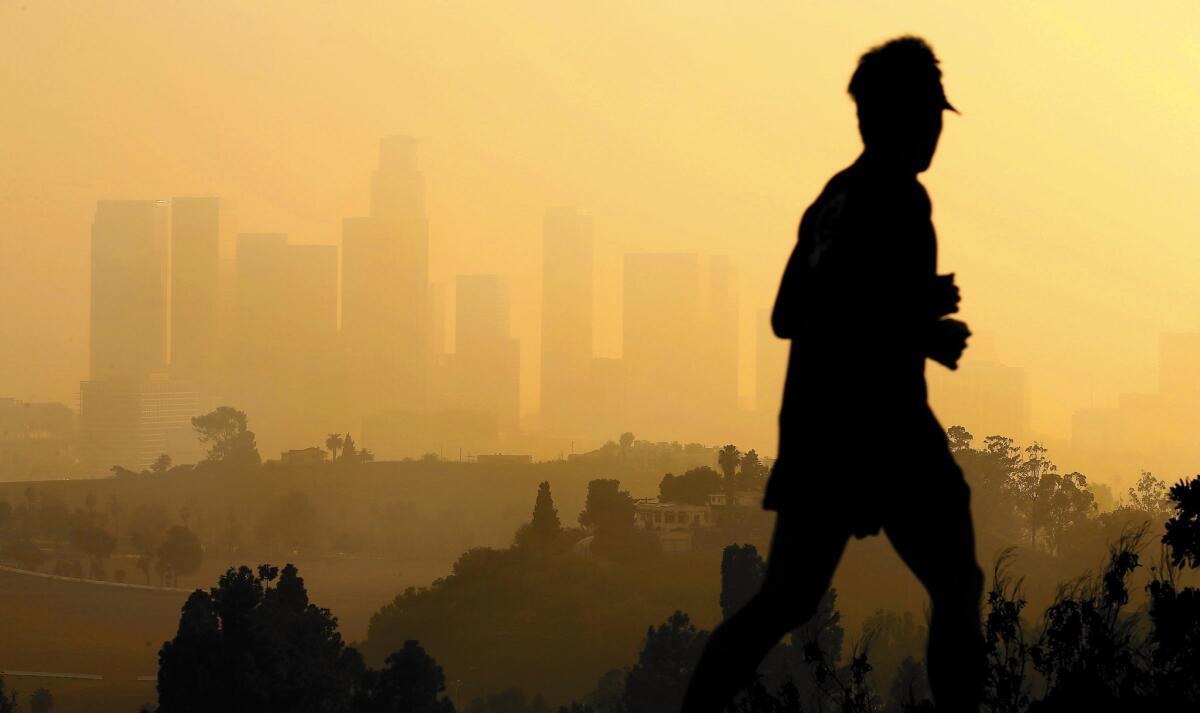Southern California air quality board is sued over adoption of industry-friendly smog rules

Community groups and environmentalists filed suit Wednesday over Southern California air quality regulators’ adoption of oil industry-backed smog regulations, saying the measures are so weak they violate state law and will hurt public health.
The lawsuit seeks to negate the South Coast Air Quality Management District board’s vote in December that rejected a staff recommendation to overhaul a cap-and-trade program for smog-forming emissions from oil refineries, power plants and other major polluters and instead adopted a proposal by the Western States Petroleum Assn.
The groups seek stronger measures to achieve steeper, faster emissions cuts and speed progress curbing smog across Los Angeles, Orange, Riverside and San Bernardino counties. The suit cites “the urgent need to clean up pollution in the South Coast air basin and the harsh consequences” — including asthma, heart disease, premature deaths and other health problems — triggered by some of the nation’s highest levels of ozone and fine particle pollution.
A spokeswoman for the South Coast air district said its legal staff was still reviewing the lawsuit and could not comment.
The air board opted to reduce the cap on nitrogen oxide emissions by 12 tons per day over the next seven years, rather than by 14 tons as proposed by air district staff. The lawsuit contends that the decision violates requirements under a state law that cap-and-trade programs achieve the same emission reductions as traditional regulations, which set rules for each piece of equipment that emits pollution.
The air district’s program “does not live up to this mandated standard, and instead perpetuates a program where some of the largest polluting sources, like refineries, simply pay to pollute, instead of installing life-saving pollution controls,” according to the lawsuit filed in Los Angeles County Superior Court.
The suit was filed by the Natural Resources Defense Council and the environmental law nonprofit Earthjustice, which represents Communities for a Better Environment, the Center for Biological Diversity and the Sierra Club.
The legal action comes days after a new Republican majority on the air board, whose members have vowed a more industry-friendly approach, voted to fire longtime executive Barry Wallerstein and to let stand its recently adopted smog regulation.
The measures have encountered sharp criticism from residents in some of the state’s most polluted communities as well as from the California Air Resources Board and state lawmakers, who had asked the air board to reconsider.
“This board has stated clearly they’re not going to fix the problem, so we’re taking them to court,” said Adrian Martinez, an attorney for Earthjustice. “Right now, the program is woefully inadequate to protect the health of millions of residents in the Los Angeles region.”
Oil industry groups have fought stronger smog-reduction measures, arguing that the cost of upgrading pollution controls would be too great.
Also on Wednesday, State Senate President Pro Tem Kevin de León (D-Los Angeles) sent a letter to Los Angeles County supervisors asking them to seek Supervisor Michael D. Antonovich’s resignation from the South Coast air board over his “long-standing opposition to policies that protect clean air.”
Antonovich, a Republican who has served on the AQMD board since 1988, voted with the majority to adopt and reaffirm the smog regulations and to fire the agency’s top executive.
Antonovich called De León’s request “extremely hypocritical and deceptive grandstanding.” He added: “I have successfully fought for nearly 30 years for clean air programs.”
Twitter: @tonybarboza
ALSO
‘Hot Felon’ Jeremy Meeks released from federal prison and gets job offers
Say anything? Complaint over loud ‘boom box’ music leads to brawl on Spirit Airlines flight
What’s wrong with the American diet? More than half our calories come from ‘ultra-processed’ foods
More to Read
Sign up for Essential California
The most important California stories and recommendations in your inbox every morning.
You may occasionally receive promotional content from the Los Angeles Times.











